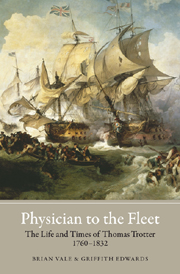Book contents
- Frontmatter
- Contents
- List of Illustrations
- List of Abbreviations
- Foreword
- Preface
- Background
- From Surgeon's Mate to Physician to the Fleet
- 3 HMS Berwick
- 4 Surgeon of a Slaver
- 5 Northumbrian Interlude
- 6 Recalled to the Colours
- 7 The Royal Hospital, Haslar
- 8 Physician to the Channel Fleet
- 9 The Conquest of Scurvy
- 10 Shore-Based in Plymouth
- 11 Honours and Half-Pay
- The Newcastle Years
- Bibliography
- Index
8 - Physician to the Channel Fleet
from From Surgeon's Mate to Physician to the Fleet
Published online by Cambridge University Press: 12 September 2012
- Frontmatter
- Contents
- List of Illustrations
- List of Abbreviations
- Foreword
- Preface
- Background
- From Surgeon's Mate to Physician to the Fleet
- 3 HMS Berwick
- 4 Surgeon of a Slaver
- 5 Northumbrian Interlude
- 6 Recalled to the Colours
- 7 The Royal Hospital, Haslar
- 8 Physician to the Channel Fleet
- 9 The Conquest of Scurvy
- 10 Shore-Based in Plymouth
- 11 Honours and Half-Pay
- The Newcastle Years
- Bibliography
- Index
Summary
WHEN WAR WAS DECLARED, Britain had taken immediate advantage of the disarray in revolutionary France. A sea-borne expedition seized her major West Indian islands; anti-republican risings in Brittany and the Vendée were supported; and Lord Hood's fleet occupied the great Mediterranean base of Toulon, destroying ships, stores and timber before it was ejected by an artillery major called Bonaparte. But there were opportunities for the French as well. Festering political discontent in Ireland and the existence of huge convoys in the western approaches carrying the wealth of the world to the city of London offered irresistible targets. Sadly for French ambitions, the revolutionary turmoil had had a disastrous effect on the organization and leadership of their navy. Yet it was still formidable, with eighty-two ships of the line, and even if traditional discipline had been weakened, a new and aggressive fighting spirit seemed to have replaced it.
Lord Howe and the ‘loose’ blockade
The British government did not see the immediate threat from France as lying in great fleet actions, but in attacks on merchant convoys by naval squadrons or privateers. In the front line of the battle to defend this economic lifeline lay the Channel Fleet, commanded by Britain's most experienced sea officer, Admiral Lord Howe. An earl in his own right, Howe was a member of the Whig aristocracy with distant links to the royal family.
- Type
- Chapter
- Information
- Physician to the FleetThe Life and Times of Thomas Trotter, 1760–1832, pp. 96 - 109Publisher: Boydell & BrewerPrint publication year: 2011



